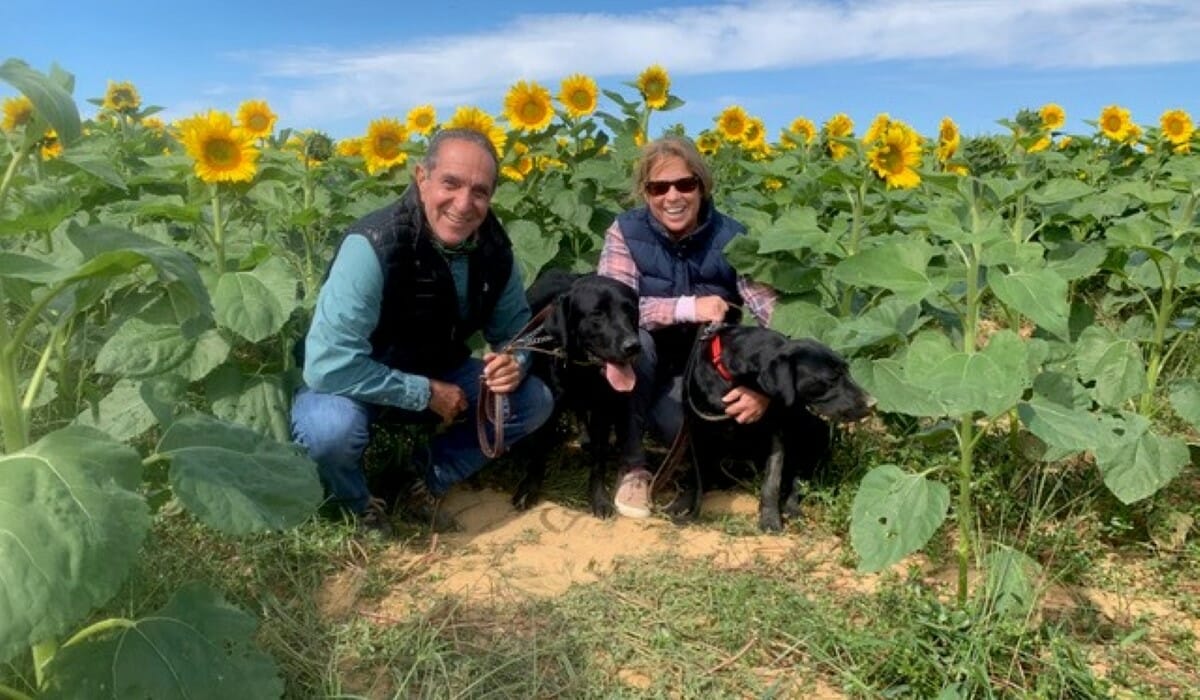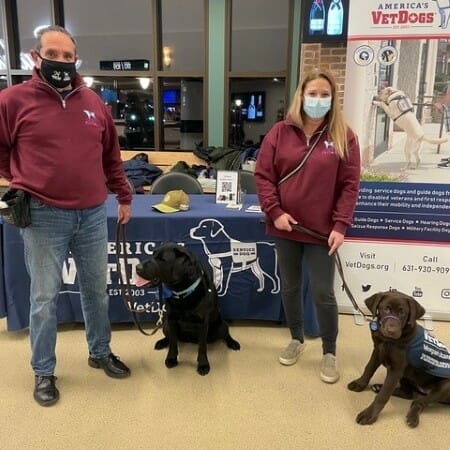New York Couple Pays It Forward With Puppies

Meet Daily Point of Light Award honorees Ron Lebow and Deborah Elkis-Abuhoff. Read their story and nominate an outstanding volunteer or family as a Daily Point of Light.
Deborah Elkis-Abuhoff and Ronald Lebow know what it’s like to deal with tragedy and personal challenges. Deb, an art therapy professor at Hofstra University, lost her first husband to cancer. Circumstances left her and her two young daughters in financial despair. Ron, a former Marine and business owner, lost his brother from the same disease. Today, in a much stronger position, and as they recognize the generosity of others during difficult times in their lives, they aim to help others who are struggling by raising puppies to become service dogs and helping raise funds to cover the intensive training.
What inspires you to volunteer?
Deborah: In 1997, I was widowed and having a hard time financially. My husband had been on disability, and I had started my doctorate program. Our food money was going to the pharmacy, because I had to buy him morphine. Right after he died, a couple whose kid was in our daughters’ classes gave me enough money to pay three month’s rent to help us get back on our feet. I didn’t take it lightly, and I promised myself that when I got back up and running, I was going to pay it forward to the community.
I discovered the Guide Dog Foundation through my daughter’s friend and her mother who were raising dogs a few years earlier, but I put it on the back burner until I was able to give back.
Ron: I knew Deborah wanted to do this, and I was on board but wasn’t fully committed. As soon as we were handed our first dog, Grey, I was all-in.
Describe your volunteer role with the Guide Dog Foundation and America’s VetDogs.
Deborah: Guide Dog Foundation for the Blind breeds and raises puppies to serve the visually impaired –your typical guide dogs. We take a puppy from eight weeks to the time they go in for formal training. Then, that dog is partnered with someone who’s visually impaired or blind. And America’s VetDog is the same kind of thing, but after training, they are partnered with a veteran or first responder with physical challenges or combat-related PTSD.
Ron: We started out being puppy-raisers, then I got involved as a transport driver bringing puppies, dogs and people to and from the airport. As members of the speaker’s bureau, we go out to public speaking events. We’ve taken Grey and Juno — the puppy we’re currently raising — out to New York Islanders hockey games to bring awareness to the organization and to try to raise some money. It takes about $58,000 to raise the dog from start to the time they give the leash to the person, and the organization doesn’t charge the recipient any money.

Do you have any pets the puppies have to get along with?
Deborah: Typically, we raise one at a time, but we have five right now. We have two 20-pound rescue dogs from Puerto Rico. They’re strictly pets. We have a trained guide dog, a handsome boy named Grey. Grey is a trained guide dog who had a career change and never went into service. We adopted him and he’s now an ambassador for both organizations. He’s a certified therapy dog, too, and he just started working — he gets paid in Kibble — with the hospital where my husband and Ron’s brother had their treatment.
We also have Skye, who is part of a breeder colony. And Juno is one of her puppies whom we’re raising for America’s VetDogs. Everybody does well, but the pet dogs are the ones who like to get in trouble!
What’s been the most rewarding part of your work?
Ron: People always ask how we can give a dog back after we’ve raised it. The answer: we see how it changes someone’s life. We get cute little puppies, and we raise them and take them to classes. It’s work, but It’s fun. When we’re out in public, and people will come up to us and say, “My mother has a dog from your organization, and it’s changed her life!” or, “It saved her life!” That’s why we do it, and that’s the reward that we get.
What have you learned through your experiences as a volunteer?
Deborah: When you see somebody in a wheelchair who might have a speech issue, you might not want to go over there, because you’ve not sure how to engage with them. All of that has gone away with the puppies. Now I have engaged where I might not have in the past and have met some amazing people as a result. I’ve learned so much. It has opened up my interactions with others.
Are there any future partnerships, programs, or events that you are excited about?
Deborah: We just walked a 5K to raise money. We have “Give-Back Thursdays” and two big fundraisers. One event coming up is a golf outing for America’s VetDogs. Another is Dogs on the Catwalk, where puppies walk the catwalk with models while wearing Anthony Rubio’s creations.
Why do you think it’s important for others to get involved?
Deborah: I was always taught to be kind to others and be supportive. I’ll hold the door for somebody. Or when someone is short a few cents at the grocery, I’ll pay it. Little things like that. When that couple came forward and did such a generous thing after my first husband died, it changed my life and helped my family survive. That was invaluable, and I can’t go through life without feeling that I have passed it forward. Everyone has their hurdles and difficulties. If we can support people and help their lives be better, we should.
Ron: My grandfather always told my father to pay it forward. My father, who just turned 100, has always been very involved with local charities, and he’s instilled that in me as well. It’s not always the about the less fortunate or those in need, but it’s about getting involved to the community.
What do you want people to learn from your story?
Ron: It doesn’t take a lot to make an impact or change someone’s life.
Deborah: We raise one puppy at a time that goes to one person. Then, it’s a domino effect. We hand someone the leash to a dog that will enhance their functioning and abilities, and that might help them get a job to be able to pay the bills or to their kids out. The thing that you think might be small could really have a big impact.
Do you want to make a difference in your community like Ron and Deborah? Find local volunteer opportunities.
